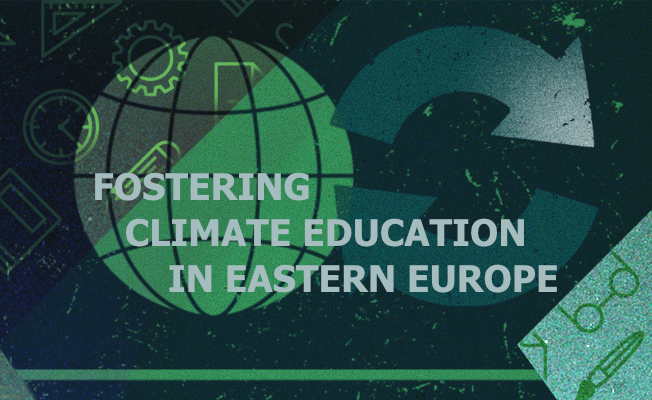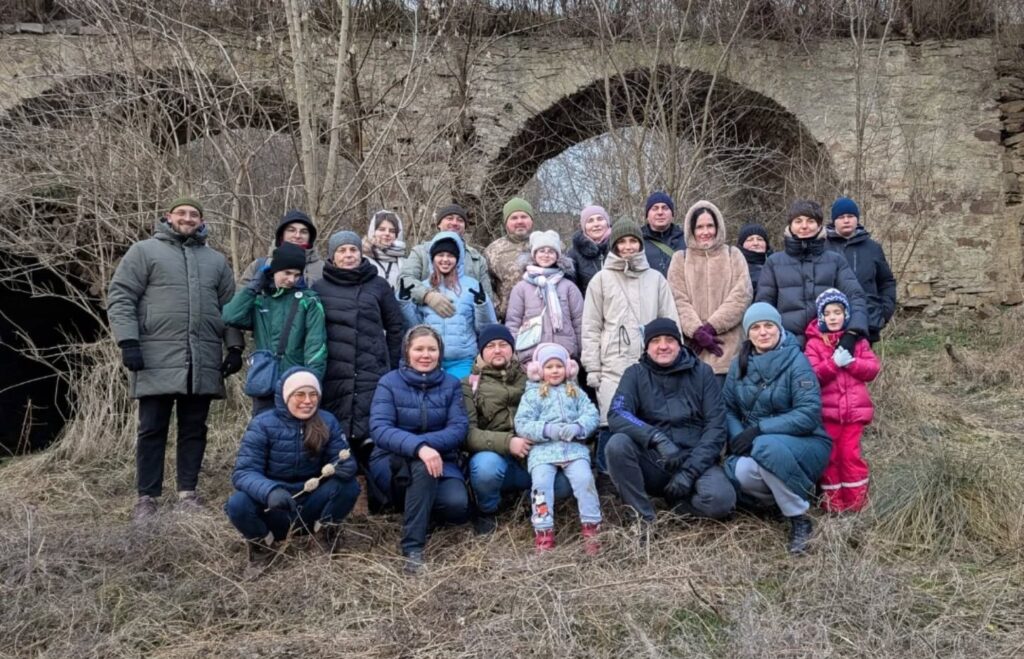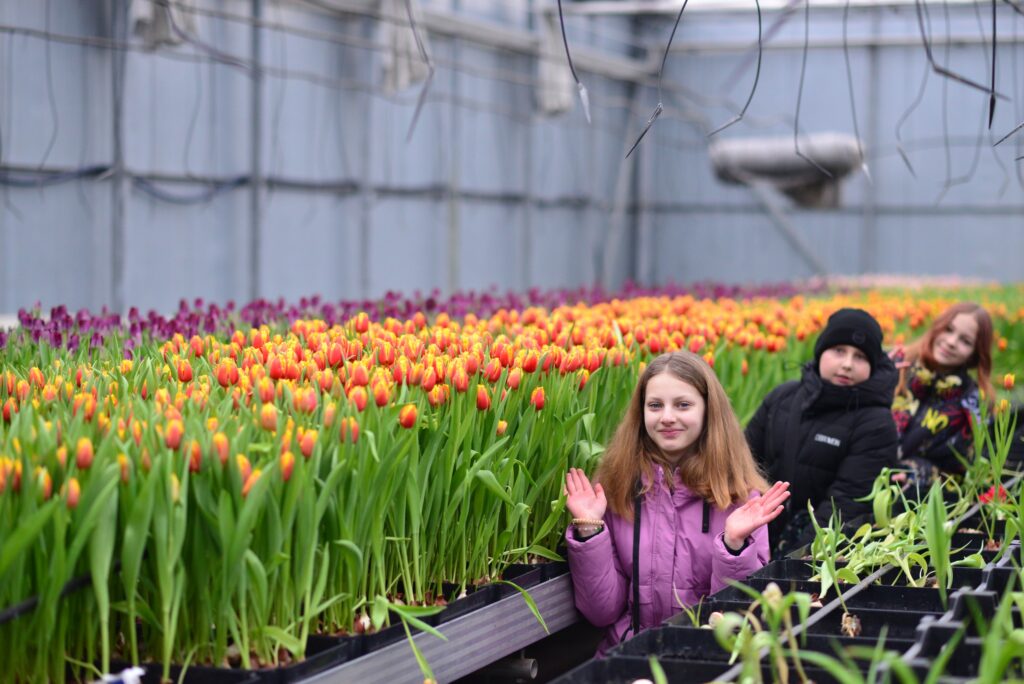Fostering Climate Education in Eastern Europe
Climate and Environment Division

A key to raising public awareness about environmental issues, especially among young people, is education. However, in the Eastern Partnership countries (“Länder der östlichen Partnerschaft”), questions of sustainable development are not integrated into state curricula. As a result, young people do not receive information about the global challenges and issues they will have to face in the future. To further educate themselves in the field of climate education, interested individuals rely on offerings from non-governmental actors.
The project ‘Fostering Climate Education in Eastern Europe’ fills this gap by enabling the development of activities to educate teachers and young people about climate change, allowing them to act as multipliers. Through specially designed interactive online courses for these target groups, qualified instructors provide participants with knowledge about climate change, sustainable development, and lifestyles. At the beginning of the project, a study was conducted to analyze the current state of environmental education in the project countries and better understand the needs of different target groups for the strategic development of climate education at various levels. Additionally, two podcast seasons (10 episodes each) on relevant environmental topics from the project countries will be produced, and four long reads about the impacts of climate change on various aspects of life will be published.
Study “Environmental Education in Armenia, Belarus, Moldova, and Ukraine”
As part of the project, the study “Environmental Education in Armenia, Belarus, Moldova, and Ukraine” was conducted. You can download it here:
Research report: Environmental education in Armenia, Belarus, Moldova and Ukraine
Interview with the author of the study
How environmental conservation is taught in different countries: Features of environmental education in Armenia, Belarus, Moldova, and Ukraine
More than 60% of the world’s population believes that environmental problems pose a serious threat to humanity due to the extreme environmental and climate situation. This is the result of a study conducted with the participation of experts from the University of Oxford as part of the ‘People’s Climate Vote.’
Our study ‘Environmental Education in Armenia, Belarus, Moldova, and Ukraine,’ conducted with the financial support of the Federal Foreign Office of the Federal Republic of Germany as part of the project ‘Fostering Climate Education in Eastern Europe,’ mainly aims not only to address environmental issues but also to provide practical ways that can be pursued in a specific region. The author, Elena Artemenko-Melyantsova (sociologist at the Belarusian State University), described the work done and the conclusions drawn.
Elena, could you please tell us how important the topic of the study is? Why is the analysis carried out in this particular context?
The solution to many environmental problems is directly related to people’s daily lives. Their behavior in specific situations is determined by the presence or absence of appropriate knowledge. Therefore, environmental education is precisely the point where efforts can make a long-term difference.
As for the regional level, things are not complicated either: environmental issues are transboundary. It is impossible to care for the ecology of one’s own country while ignoring the situation in neighboring countries. Rivers, landscapes, and wildlife are interconnected. Hence, a regional approach is necessary.
How close are you to the topic?
There are at least three points of contact. First, I am constantly engaged in applied social research. Second, I apply my professional skills in the field of education. Third, I have experience in environmental work, as I was a member of the NGO ‘Bird Life Belarus’ (‘Аховы птушак Бацькаўшчыны’) for a long time.
Let’s get back to the study itself. How was it organized? And what methodology was applied?
Our goal was to structure and summarize the information on this topic. This included existing studies, reports, international and national legislation. Additionally, twelve experts from Armenia, Belarus, Moldova, and Ukraine were interviewed, helping us set priorities and identify problematic aspects.
Does the study cover the entire education systems of the respective countries or individual institutions?
To obtain a comprehensive picture, we collected information on formal education, divided into preschool, school, and vocational education, as well as non-formal and additional education. I want to emphasize that ‘non-formal education’ refers to any training that does not directly lead to a degree; ‘additional education’ refers to professional or intellectual self-improvement but not an improvement in the level of education.
With such a wealth of information analyzed, what commonalities can you find regarding environmental education in Armenia, Belarus, Moldova, and Ukraine?
All the countries under consideration have a Soviet past, so their education systems are similar. The starting point and development directions are essentially similar as well. The influence of the intensity of interaction with the EU and international organizations is also noticeable in the overall progress in environmental protection.
The problems of financing development programs for environmental education are also similar. In all these countries, they rely on donor aid, which may affect their sustainability in the future.
A common problem is also the prestige of environmental professions, leading to a shortage of qualified personnel. There are also nuances in the alignment of specialized training programs with the requirements of employers. The latter either fall short of general requirements or see the role of an ecologist as purely formal.
What about the positive and negative differences?
As I mentioned, the starting points and the direction in which environmental education should move are the same everywhere, but success in this regard varies among the countries.
Armenia: Serious steps are taken at the level of national legislation to support the idea of environmental legislation. However, experts note that most decisions exist only on paper since almost no funding is provided for their implementation. At the same time, the role of non-governmental organizations in implementing environmental education projects should not be overlooked. For example, there is the Acopian Center for the Environment at the American University of Armenia, which is clearly supported by the Armenian diaspora in the USA.
Belarus: On the one hand, national law provides the conditions for the development of environmental education, and this agenda is maintained in state programs. The centralized distribution of administrative resources also significantly contributes to expanding environmental programs and initiatives. Until a certain period, this led to good results. On the other hand, in 2021, many NGOs that actively worked on environmental education and ideas for sustainable development were forced to cease their existence. This logically affected the quantity and quality of available eco-initiatives.
Moldova: Difficulties exist in the availability of organizational structures that could bring together the efforts of society and authorities. However, there are clear efforts to improve the legal framework for environmental education in the country. For example, programs with environmental courses have been introduced in schools.
Ukraine: Despite hostilities, the country is striving to fulfill its commitment to the development of environmental education. There is very strong international cooperation here. Openness and promotion of donor financing are prevalent. A clear sign that environmental education is constantly on the agenda is the state ecological academy for postgraduate education and management. It is an independent educational center that trains professionals and develops appropriate programs.
Elena, which potentials for the development of environmental education arise from the study’s findings, would you emphasize?
I would like to mention two key directions. In all the listed countries, the number of preschool children is high. However, environmental education is not adequately represented at this level. Kindergartens have the most contact with parents and could easily involve families in projects while creating a good knowledge base for children.
Another direction would be to improve the environmental education of officials. This could help avoid a formal approach to environmental protection measures and achieve better understanding and support for environmental initiatives.
Overall, there is much room for development regarding legislation, revising approaches to organizing the educational process, and civic activities. I hope that my work will help experts from different countries draw attention to existing strengths and weaknesses.
Thank you for the interview!
Project donors
The project was funded by the German Federal Foreign Office from March 2022 to December 2023.






